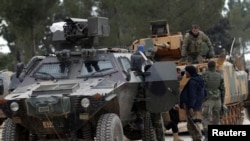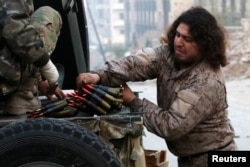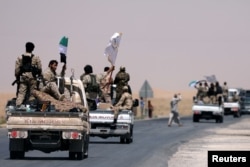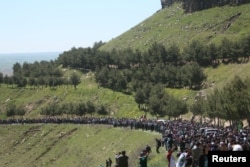The U.S.-led coalition in Syria is closely monitoring Turkey's arming and training of a Syrian militia in northern Syria and asking Turkey instead to return the region to control of local residents, coalition sources told VOA.
U.S. Army Colonel Joseph Scrocca, spokesman for the U.S.-led coalition's Operation Inherent Resolve, told VOA that the coalition "feels strongly that any land seized [from Islamic State] should be returned to the people and governed by local representatives from that area."
The coalition's focus is on defeating IS in Syria and Iraq, and "we urge all of our partners and allies to do the same," Scrocca said.
'National army'
Scrocca's comment came as the Turkish military is working to establish a "national army" for rebel Free Syrian Army (FSA) fighters to operate in northern Syria's Jarabouls and al-Bab areas.
The two areas were seized from IS during a Turkey-supported operation known as Euphrates Shield, which involved Turkish troops and tanks and some FSA factions.
The operation began in August 2016 and ended in March, and the area along the Turkey-Syria border remains under the Turkish army's control.
Syrian Kurds see Turkey's presence as a de facto occupation. Turkish officials say more than a million residents have returned to their homes and the IS presence on the Turkish-Syrian border has been eradicated.
"Once we have created a safe zone, the Syrians will be able to establish their national army, so they can feel safe," Turkish President Recep Tayyip Erdogan said in May.
Turkish officials said the expanded FSA unit has 10,000 to 12,000 fighters and will be prepared to carry out defensive and offensive operations inside Syria.
"They will show their difference in possible future operations and they will be successful," the Anadolu Agency, a news agency headquartered in Ankara, quoted one Turkish military official as saying.
Training of FSA members
Metehan Demir, a Turkish defense and military analyst, told VOA that training of FSA members started in March, when the government prepared two military camps in Turkey's Hatay and Kilis areas.
Turkey's official news agency said the unit was being trained in how to use weapons, including mortars, rocket launchers and machine guns.
"Hatay camp is especially very well-organized for this purpose," Demir said.
He said Turkey would most likely use the new FSA unit to try to counter the increasing influence of Kurdish YPG forces who are leading the Syrian Democratic Forces (SDF) in a major battle for the IS stronghold of Raqqa.
While the United States supports the YPG and sees it as a key Syrian partner in the fight against IS, Turkey opposes its role and considers it a terrorist organization linked to Turkish-Kurdish separatists inside Turkey, known as the PKK.
"The message from Ankara to Washington is clear," Demir said, "Don't cooperate with YPG, because we are training a new FSA that can do a better job."
U.S. officials have not commented on Turkey's reinforcement of the FSA.
After the U.S. announced last month that it was sending arms to the SDF for the Raqqa operation, Erdogan warned that Turkey would not remain idle and watch the YPG gain in strength. He said Turkey would "exercise its rights under the rules of engagement."
Not likely to align
Analysts say it is unlikely that U.S. forces will align with the Turkey-backed FSA.
"By all reports, the U.S. military does not believe that the FSA forces being trained by Turkey are anywhere near ready to carry out the Raqqa-related mission that SDF/YPG forces are performing," Alan Makovsky, senior analyst for the Center for American Progress and a former U.S. State Department official, told VOA.
Kurdish officials say they are concerned that Turkish-supported militias will ultimately attack their areas and disrupt the Raqqa operation.
"Turkey should cease its involvement in Syria and focus on resolving its internal problems, especially with its Kurds," Salih Muslim, co-chairman of the Syrian Kurdish Democratic Union Party, which provides political direction to the YPG, told VOA.
Muslim accused Turkey of supporting extremist groups to stop Kurdish aspiration for autonomy, and he pleaded with the U.S. for more support.
"Our focus will be to liberate Raqqa and bring back security to it," Muslim said. "America has by now realized how important Syrian Kurds are for the region's stability."
The U.S. in recent months has tried to prevent direct confrontations between Turkey and the YPG. When Turkish planes and artillery attacked YPG bases in April, U.S. troops began patrolling the Syria-Turkey border and tensions eased.
And Turkey's influence on the FSA does not extend deep into Syria, analysts say. Rebels south of the Turkish-controlled area in Syria are reportedly severing ties with the FSA and former self-styled militias that are becoming aligned with the U.S.-led coalition.
"Turkey's biggest challenge over the long term might be consolidating its hold on the territory it now holds," Makovsky said. "Based on the internal fighting and defections among FSA forces in al-Bab, it will need a far more reliable proxy than the FSA forces it now commands."







